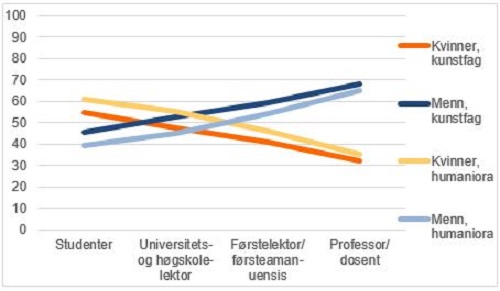I kjønneste orden?
Kvalitet og betydningen av kjønn i vurdering av professor- og dosentkompetanse i kunstfagene
DOI:
https://doi.org/10.7577/information.v8i1.2853Abstract
The aim of this article is to contribute to discussions concerning what is meant by quality in the assessment of professors and docents for promotion, by investigating if and how gender might influence the ways in which quality is measured and articulated in these processes. The study analyses interviews with five experienced committee members from higher art education institutions in Norway. Our results point to three main discourses: a quality discourse, a gender discourse, and an elite discourse. The study shows that committee members operationalize notions of quality in terms of markers such as arena, audience types, innovation, collaborations, and novelty. At the same time, the informants emphasize that the criteria in the regulations concerning appointment and promotion are unclear. According to the informants, these vague criteria, together with a dominant elitist definition of art in art education, causes those who already have power in the field to hold possession of what constitutes quality. They stress that it is especially difficult to explicate criteria for artistic qualities. The committee members say that gender influences both the way one assesses quality, and how applicants for promotion describe their own quality. The study points to a need for more clearly articulated criteria concerning what constitutes artistic quality in the assessment of professors/docents applying for promotion in performing arts education.

Downloads
Published
How to Cite
Issue
Section
License
Authors who publish with this journal agree to the following terms:
- Authors retain copyright and grant the journal right of first publication with the work simultaneously licensed under a Creative Commons Attribution License that allows others to share the work with an acknowledgement of the work's authorship and initial publication in this journal.
- Authors are able to enter into separate, additional contractual arrangements for the non-exclusive distribution of the journal's published version of the work (e.g., post it to an institutional repository or publish it in a book), with an acknowledgement of its initial publication in this journal.
- Authors are permitted and encouraged to post their work online (e.g., in institutional repositories or on their website) prior to and during the submission process, as it can lead to productive exchanges, as well as earlier and greater citation of published work (See The Effect of Open Access).